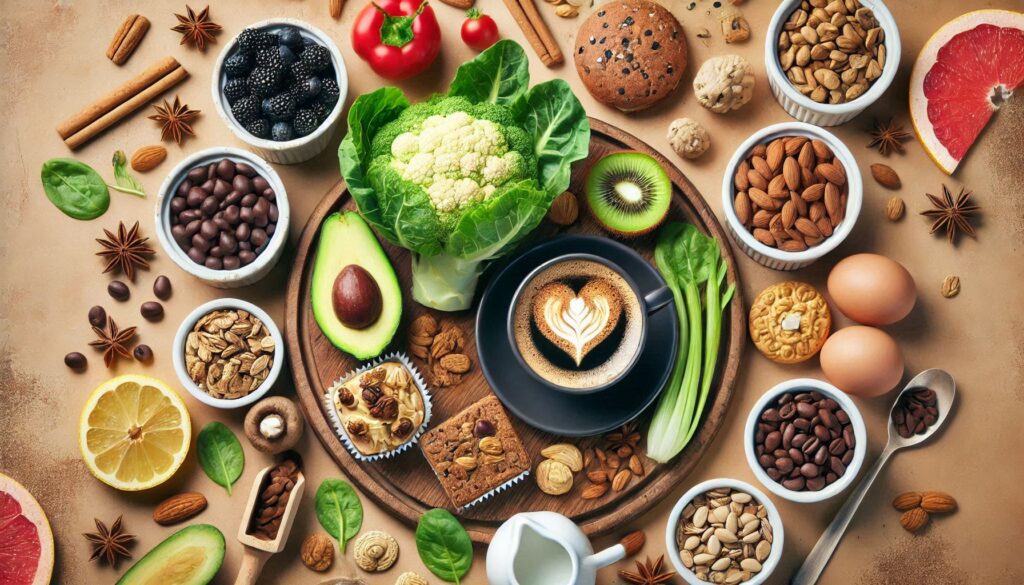In today’s fast-paced world, stress and anxiety have become common problems that affect millions of people. While managing stress is a multi-faceted process that involves lifestyle changes, one of the most effective natural ways to reduce stress and anxiety is through diet. Certain foods have been shown to promote relaxation, stabilize mood, and reduce the physical symptoms of stress. In this article, we will explore various foods that help reduce stress and anxiety naturally, so you can incorporate them into your diet and enjoy a calmer, more peaceful life.
Why Diet Matters for Stress and Anxiety
Your diet plays a crucial role in how your body responds to stress. When you’re stressed or anxious, your body releases stress hormones like cortisol and adrenaline. These hormones can cause physical symptoms like a racing heart, tension, and irritability. Fortunately, certain foods can help regulate the production of these hormones, calm the nervous system, and improve overall mental health. A well-balanced diet can significantly reduce the symptoms of stress and anxiety, making it an essential tool for managing mental well-being.
1. Fatty Fish: The Power of Omega-3 Fatty Acids
Fatty fish such as salmon, mackerel, and sardines are rich in omega-3 fatty acids, which have been shown to help reduce anxiety and depression. Omega-3s are essential fats that support brain health and function. They help regulate neurotransmitters, such as serotonin and dopamine, which are responsible for mood regulation.
Why Omega-3s Help Reduce Stress and Anxiety:
- Anti-inflammatory Properties: Omega-3s help reduce inflammation in the brain, which has been linked to anxiety and depression.
- Boost Mood: Regular consumption of omega-3 fatty acids can help balance mood and lower stress levels.
How to Include Omega-3 Fatty Acids in Your Diet:
- Eat fatty fish like salmon, mackerel, and sardines at least two times a week.
- If you’re not a fan of fish, you can also get omega-3s from flaxseeds, chia seeds, and walnuts.
2. Dark Chocolate: A Delicious Stress Reliever
Dark chocolate is not only delicious but also packed with antioxidants and compounds that can help reduce stress. Specifically, dark chocolate contains flavonoids, which have been shown to improve mood and lower stress hormones.
Why Dark Chocolate Helps with Stress:
- Boosts Serotonin and Endorphins: Dark chocolate increases the production of serotonin (the “feel-good” hormone) and endorphins, which are natural stress relievers.
- Reduces Cortisol Levels: Studies suggest that eating dark chocolate can reduce cortisol levels, helping you feel more relaxed.
How to Enjoy Dark Chocolate for Stress Relief:
- Opt for dark chocolate with at least 70% cocoa to get the maximum benefits.
- Enjoy a small piece of dark chocolate as a treat during the day or when you feel stressed.
3. Leafy Greens: The Role of Magnesium in Stress Relief
Leafy greens such as spinach, kale, and Swiss chard are rich in magnesium, a mineral that is essential for relaxing the nervous system and promoting better sleep. Magnesium deficiency has been linked to increased anxiety and stress levels.
How Magnesium Helps with Stress and Anxiety:
- Regulates Cortisol Levels: Magnesium helps regulate cortisol, the stress hormone, keeping it at healthy levels.
- Promotes Relaxation: Magnesium supports the production of GABA, a neurotransmitter that helps calm the brain and reduce anxiety.
How to Include Leafy Greens in Your Diet:
- Add spinach or kale to salads, smoothies, or omelets.
- Include Swiss chard or collard greens as a side dish with your meals.
4. Nuts and Seeds: A Healthy Source of Essential Fatty Acids
Nuts and seeds, such as almonds, walnuts, and pumpkin seeds, are packed with healthy fats, magnesium, and zinc, all of which play a role in reducing stress and anxiety. These nutrients help regulate mood, calm the nervous system, and stabilize blood sugar levels.
Why Nuts and Seeds Are Good for Stress:
- Rich in Magnesium: Nuts like almonds and cashews provide magnesium, which promotes relaxation and reduces stress.
- Support Brain Function: Walnuts and pumpkin seeds contain omega-3 fatty acids that help improve brain function and reduce anxiety.
How to Add Nuts and Seeds to Your Diet:
- Snack on a handful of almonds, walnuts, or sunflower seeds.
- Add chia seeds or flaxseeds to your smoothies or oatmeal.
5. Avocados: A Creamy Stress-Busting Superfood
Avocados are not only creamy and delicious but also packed with healthy fats and nutrients that help reduce stress. They are rich in B vitamins, especially B6, which plays a role in the production of serotonin and dopamine.
Why Avocados Help with Stress:
- Rich in Healthy Fats: The monounsaturated fats in avocados help stabilize blood sugar levels, preventing mood swings and anxiety.
- Boost Mood: Avocados contain folate, which has been linked to improved mood and reduced symptoms of anxiety and depression.
How to Include Avocados in Your Diet:
- Enjoy sliced avocado on toast, in salads, or as a topping for tacos.
- Blend avocado into smoothies for added creaminess and nutrients.
6. Herbal Teas: Calming and Soothing
Herbal teas are known for their calming properties and can help reduce stress and anxiety naturally. Teas like chamomile, peppermint, and lavender have been used for centuries to promote relaxation and improve sleep quality.
Why Herbal Teas Help with Stress:
- Chamomile Tea: Chamomile has mild sedative properties that can help reduce anxiety and promote sleep.
- Peppermint Tea: Peppermint helps relieve tension and soothe the digestive system, which can improve overall well-being.
- Lavender Tea: Lavender is known for its calming effect, helping to alleviate anxiety and promote mental clarity.
How to Enjoy Herbal Teas for Stress Relief:
- Brew a cup of chamomile or lavender tea before bed to help you relax.
- Sip peppermint tea throughout the day to calm your nerves and reduce tension.
7. Berries: Antioxidants for Stress Relief
Berries like strawberries, blueberries, and raspberries are packed with antioxidants, which help reduce oxidative stress in the body. These antioxidants protect the brain from the harmful effects of stress and reduce inflammation.
Why Berries Help with Stress:
- High in Vitamin C: Berries are rich in vitamin C, which has been shown to lower cortisol levels and reduce the physical effects of stress.
- Rich in Antioxidants: The antioxidants in berries help combat oxidative stress, which can contribute to anxiety and mental fatigue.
How to Incorporate Berries into Your Diet:
- Add fresh berries to your morning cereal, oatmeal, or yogurt.
- Blend berries into smoothies or enjoy them as a snack.
8. Whole Grains: A Source of Steady Energy
Whole grains such as oats, quinoa, and brown rice are complex carbohydrates that help regulate blood sugar levels and provide a steady source of energy throughout the day. Low blood sugar can lead to irritability and increased stress, so consuming whole grains can help stabilize your mood.
Why Whole Grains Help with Stress:
- Boost Serotonin Production: Whole grains help increase serotonin production in the brain, improving mood and reducing anxiety.
- Stabilize Blood Sugar: The fiber in whole grains slows the absorption of sugar into the bloodstream, preventing blood sugar crashes that can lead to stress.
How to Include Whole Grains in Your Diet:
- Start your day with oatmeal or quinoa porridge.
- Enjoy brown rice, whole wheat pasta, or whole-grain bread as part of your main meals.
Conclusion: Foods That Help Reduce Stress and Anxiety
Incorporating the right foods into your diet can be a powerful tool in managing stress and anxiety naturally. From fatty fish rich in omega-3s to dark chocolate and leafy greens packed with magnesium, there are numerous foods that can help calm the mind and reduce stress levels. By focusing on a diet that includes nutrient-rich, anti-inflammatory foods, you can support your mental and physical well-being, making it easier to manage daily stress.


